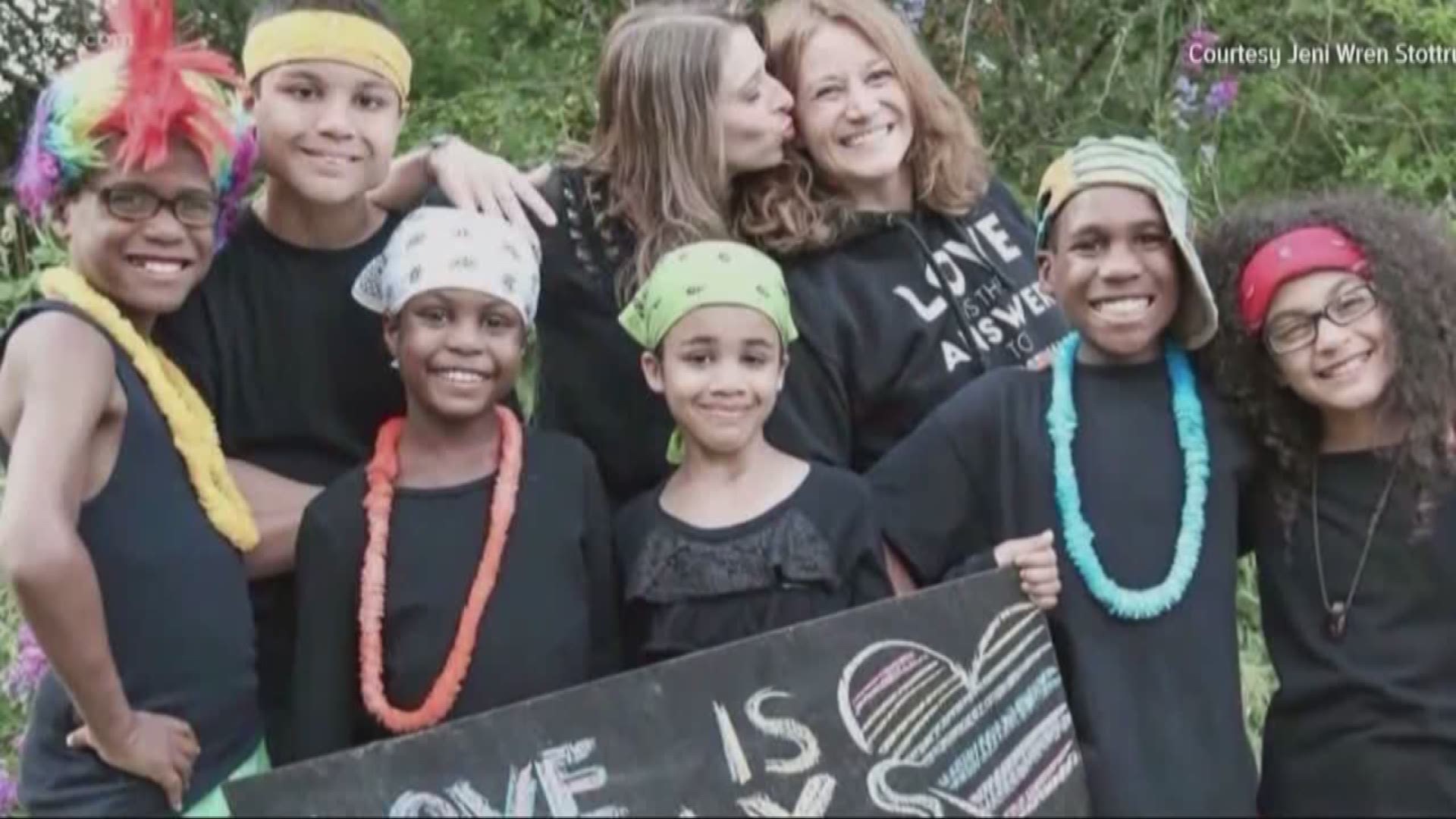PORTLAND, Ore. – Oregon’s Department of Human Services investigated reports of neglect involving the Hart family in 2013, newly released documents from DHS and West Linn Police show.
Oregon DHS also learned of several detailed abuse and neglect allegations from Minnesota, where the Hart family previously lived, the documents reveal. Even so, Oregon officials determined there was not enough evidence about the new allegations to continue with their investigation.
DHS did not contact the Hart family after the 2013 investigation. In 2017, the family moved to Woodland, Wash., where neighbors again reported neglect. The day Washington Child Protective Services visited the family to check in, the mothers, Jennifer and Sarah Hart, left with their six adopted children.
Three days later, the family’s SUV was found at the base of a cliff on the California coast. The bodies of Sarah, Jennifer and four children: Markis, 19, Jeremiah, 14, Abigail, 14, and Ciera, 12, have been found. Two children, Devonte, 15, and Hannah, 16, are missing and presumed dead.
On Monday, the Oregon Department of Human Services released two files related to a DHS investigation of the Hart family in 2013, when the Harts lived in West Linn. One was generated by the West Linn Police Department. The other was the DHS report.
The documents show that Oregon knew about the abuse allegations from Minnesota, including reports that Jennifer and Sarah Hart beat two of their kids and deprived all of their children of food as punishment.
“These women look normal,” a Minnesota case worker wrote, but “these children risk falling through the cracks.”
The documents also reveal what happened during an Oregon investigation that involved a sit-down interview with the entire Hart family.
Reports of neglect
Oregon DHS received two separate reports of neglect, documents show.
One report was filed with the Clackamas County DHS by a friend who lived in Oregon and knew the Harts from the Midwest. She described a pizza party and sleepover the family had at her home, a few months after the Harts moved to West Linn.
According to the caller, Jennifer Hart gave each child one slice of pizza and some water but that night, it appeared that one of the children raided the refrigerator.
The caller reported, “Jen grabbed [Ciera] out of a dead sleep by the arm and said ‘I can’t believe them!’ and took her to the bathroom. When they came back, Jen had all six kids lay on an inflated air mattress with sleeping masks on their face, and their arms by their side for five hours.”
The caller told DHS the children had been adopted between five and seven years prior, and while the children have gotten taller, they have not gained weight, the report shows. The caller alleged that Jennifer and Sarah Hart would take their children to music festivals and have the children pose for Jennifer’s Facebook page, but “after the photo event, they go back to looking lifeless,” the report said.
The caller informed DHS of child welfare reports in Minnesota. The caller told DHS that Jennifer and Sarah Hart pulled their children out of public school after the welfare reports and questioned whether the children were receiving any education.
A second report was generated by a person who said the children appear undernourished.
DHS learned of Minnesota complaints
By releasing the Hart investigation documents, Oregon Department of Human Services revealed they knew of detailed abuse and neglect allegations from Minnesota.
DHS contacted Minnesota Child Welfare and learned of six separate reports of abuse or neglect, two of which resulted in disciplinary action.
The reports included allegations that Jennifer and Sarah hit and left marks on their children Abigail and Hannah. When questioned, all six children told Minnesota officials they were denied food as a punishment. They were also “made to stay in bed all day, or stand in a corner for a long time,” the report said.
In one report from 2010, Abigail said she found a penny and Jennifer and Sarah accused her of stealing it. Abigail had several bruises on her stomach and back, and said her mothers “put her head under cold water, and Jen had two hands on her neck,” the report said. Sarah Hart said she spanked Abigail and it got “out of control.”
Sarah Hart pleaded guilty to domestic assault and was sentenced to 90 days in jail, which she wasn’t required to serve due to terms of her probation. The family also agreed to in-home therapy and counseling as a punishment.
The children also would rummage through the garbage for food at school and take food from other kids at school, according to Minnesota reports.
According to Minnesota Child Protective Services, when the assessment was finished, the Hart family pulled their children out of school and began homeschooling them.
DHS interviews family
Oregon DHS records show state officials visited the family’s home in July 2013 but no one answered the door. The Hart family agreed to an interview, which happened on August 26.
According to the DHS report, workers said the Hart children all appeared small for their ages. Jennifer and Sarah described how the children were exposed to violence, guns and drugs, and had been small before they were adopted.
The most outgoing child, DHS workers said, was Devonte Hart, the boy who later became famous for taking a photo with a police officer at a Portland rally. The workers said Devonte “presented as very social and was the first child to introduce himself.”
The other children were quiet and reserved. None discussed neglect issues, according to the DHS workers’ reports.
The DHS workers saw that Hannah Hart, who was 11 at the time, appeared small for her age and had no front teeth. Jennifer and Sarah Hart said Hannah knocked out her teeth when she was running on hardwood floors the year before, and they needed to wait another year for dental treatment.
Jennifer Hart said the family uses “meditation as punishment,” the report said, and she “believes in emphasizing and teaching love and compassion to the children,” which she does often through the music festival community. Jennifer reported that she was not currently working but was “very involved in the music festival community and travels with the children for several weeks and months a year,” the report said.
Jennifer appeared “hesitant initially to have the children interviewed alone by a coworker. During the interview she… primarily dominated the conversation and appeared more outspoken,” the report said.
Sarah Hart told DHS the family is vegetarian and “very concerned about eating organic, whole, sustainable food,” the report said. She also discussed the family’s lifestyle choices of homeschooling and interest in naturopathic medicine, meditation and yoga. The Harts told DHS workers “much of the family’s issues and reports made, stem from others not understanding [the] family’s alternative lifestyle,” the report said.
Sarah Hart declined to discuss details of the abuse charges in Minnesota with investigators.
Harts had $2,000 monthly adoption assistance payment, foster problems
Sarah and Jennifer Hart adopted the six Hart children from Texas in 2009. Records show that Jennifer reported receiving about $2,000 a month in adoption assistance for the kids. Sarah Hart told DHS workers she was the primary financial provider and worked at Kohls in Beaverton.
The Harts also tried to foster another child, the report shows. Minnesota officials told Oregon DHS that in October 2010, the Harts requested to be certified for foster care when they were taking care of a friend’s teenage daughter. Minnesota officials reported that “this placement didn’t work out for very long, and one of the breaking point issues was the girl used wire hangers against the Hart’s wishes.”
Failure to find sufficient evidence of neglect
Although Oregon knew of the Minnesota reports of abuse and neglect, the state was unable to find sufficient evidence of ongoing neglect stemming from how Sarah and Jennifer Hart treated their children.
DHS ordered a report from the Hart children’s doctor. Documents show DHS received a letter from the doctor “indicating no concerns for any of the children,” even though all six kids were below the medical growth chart for weight and height.
“The medical provider did not have a baseline for the children or past medical records to reference,” DHS wrote.
DHS ruled that they were “unable to determine” evidence of neglect for any of the six Hart children, despite some indications of issues. DHS wrote in the Justification for the Disposition in the Hart Case:
“Unable to determine, which means there are some indications of child abuse or neglect, because there is insufficient data to conclude that there is reasonable cause to believe that child abuse or neglect occurred.”
The state did not contact the Hart family again and did not receive any more reports of neglect or abuse.
Records could ‘help avoid future tragedies’
Oregon DHS released the investigation documents on Monday after initially denying media requests, because the agency said it may help prevent another incident like the Hart case from happening.
“We believe the release of these records may help avoid future tragedies by encouraging consideration of a national clearinghouse for records or identification of other systems or processes for the prevention and protection from child abuse and neglect, particularly as to children and families who move across state lines,” said Caroline Burnell with DHS.
The DHS said it has changed its policy since the 2013 investigation and the new protocol may have resulted in a different outcome for the Hart children.
“Since the time of the Hart family assessment, DHS has shifted practice from incident based investigation to comprehensive safety assessments that consider multiple factors of a family’s functioning to determine the immediate and ongoing safety needs of a child,” Burnell said.
DHS also began training case workers to “assess factors that contribute to a child’s vulnerability such as isolation."
“Children who have no outsiders observing them are considered highly vulnerable under the model and this factor must be considered throughout the assessment when making child safety decisions,” Burnell said.



